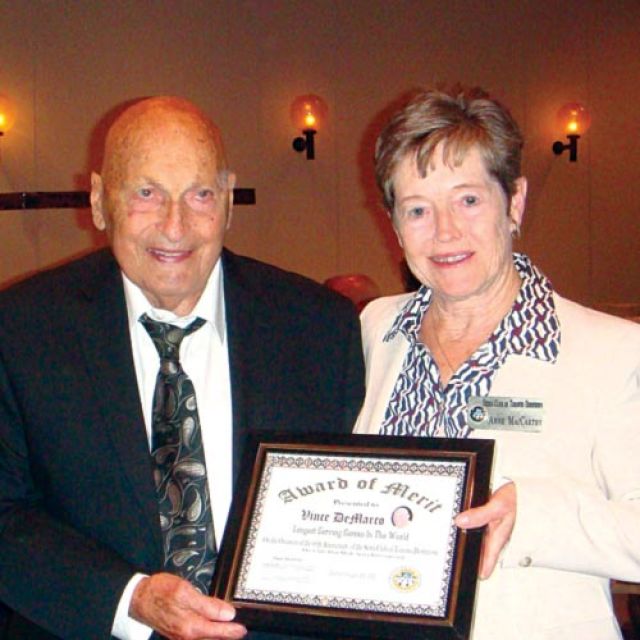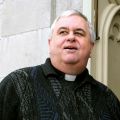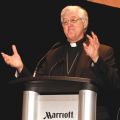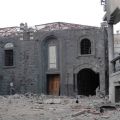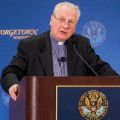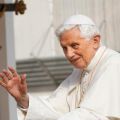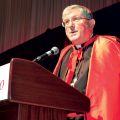NEWS
TORONTO - Serra Canada is celebrating 60 years of encouraging and supporting those who are contemplating religious life.
“We need priests particularly to keep our Church alive,” said Anne MacCarthy, current president of the Serra Club of Toronto Downtown. “We just know that there’s a strong need for vocations to the priesthood and religious life in the Catholic Church, so we think we have a stake in it.”
The Toronto club is part of Serra Club International, a non-profit organization of lay Catholics devoted to praying and fostering vocations to the priesthood and other consecrated religious vocations.
MacCarthy and her husband Dane have been part of Serra since 2003. One morning, a neighbour walked her home from church, she recalls, and asked her to join Serra.
“I hauled my husband behind me,” she jokes, and nine years later, even their son has joined the club.
“The harvest is plentiful, the labourers are few, and so we want to encourage as many priests and potential sisters to come forward,” Dane, treasurer and past president of Serra Club of Toronto Downtown, said on the importance of lay people in another’s vocation. “Being a priest or a sister is not an easy task, so we’re trying to affirm those who have chosen that path as well. We offer our support to them and we pray for them on a regular basis.”
The MacCarthys enjoy the countless speakers the club invites to its bi-monthly meetings. And at the Serra Fall Conference in late September, celebrating the 60th anniversary of Serra in Canada, Anne presented an award to the longest-serving Serran in the world, Vincent DeMarco, who joined the local branch shortly after it was founded.
The Serra Club began in Seattle in 1935. The club was named after Spanish Franciscan Blessed Junipero Serra who founded missions in Mexico and the United States. In 1952, the Toronto Downtown club was the first to open outside of the United States.
There are currently three clubs in Toronto, 15 in Canada and 1,109 in 46 countries across the globe.
Serra Club provides “an opportunity to hear speakers help us with our faith and with matters of day-to-day concern for Catholics,” said Celeste Iacobelli, a past president of the Toronto Central Serra Club and a current board member of the Serra Canada Foundation.
Joining Serra “gave me an opportunity to meet with other like-minded Catholics interested in promoting vocations to the priesthood, interested in supporting our Catholic principles,” he said.
Iacobelli and the MacCarthys agree that one of the most memorable Serran events is the Ordinandi dinner, where seminarians soon to be ordained tell their vocation story.
“It’s the largest gathering of Catholics in the archdiocese of Toronto,” said Iacobelli.
He finds it “particularly satisfying” when students from schools across the archdiocese are invited to the dinner.
Some students attend a dialogue session with the ordinandi.
“It gives them a wonderful perspective on what it means to be an ordained priest, what went through the process of discernment, how the young men struggled with their decisions in some cases, how they left other careers behind.”
Canonization rite changed to preserve integrity of Mass, monsignor says
By Cindy Wooden, Catholic News ServiceVATICAN CITY - In a continuing effort to preserve the integrity of the Mass and highlight the meaning of a canonization, when Pope Benedict XVI declares seven new saints Oct. 21, the ceremony will look different than it has in the past.
Msgr. Guido Marini, master of papal liturgical ceremonies, said the change will mark another step in Pope Benedict's efforts to remove from the papal Mass elements that are not strictly part of the liturgy, in accordance with the teaching of the Second Vatican Council.
Earlier, the Pope stopped giving new cardinals their rings during Mass; and in June he started the practice of giving new archbishops a pallium — a woolen band around their necks — before the entrance antiphon of the Mass.
In a similar way, beginning Oct. 21, the canonization rite will take place before Mass begins.
"Canonization is basically a canonical act" through which the Pope exercises his ministry to teach and to legislate, Marini told L'Osservatore Romano, the Vatican newspaper.
"In effect, a canonization is a definitive sentence through which the supreme pontiff decrees that a servant of God, already listed among the blessed, is to be inscribed in the catalogue of saints and venerated in the universal church," the monsignor said.
"The authority exercised by the Pope in a canonization sentence will now be even more visible through the use of certain ritual elements," particularly through the Pope's triple invocation of God's help in making such an important decision, he said.
Marini said the distinction between the canonization rite and the celebration of the Mass is meant to respond to the Second Vatican Council's call for the "splendour of the noble simplicity" of the Mass to shine forth.
The seven women and men who will be proclaimed saints with the new ceremony are:
-- Blessed Kateri Tekakwitha, a native American who was born in upstate New York and died in Canada in 1680 at the age of 24.
-- Blessed Marianne Cope of Molokai, who led a group of sisters from New York to the Hawaiian Islands in 1883 to establish a system of nursing care for leprosy patients.
-- Blessed Peter Calungsod, a lay catechist from the Philippines who was martyred April 2, 1672, in Guam.
-- Blessed Jacques Berthieu, a Jesuit who was born near Polminhac, France, and was martyred June 8, 1896, in Ambiatibe, Madagascar.
-- Blessed Giovanni Battista Piamarta, an Italian priest and founder of the Congregation of the Holy Family of Nazareth for men and the Humble Servants of the Lord for women. He died in 1913.
-- Blessed Carmen Salles Barangueras, the Spanish founder of the Sisters of the Immaculate Conception. She died in 1911.
-- Blessed Anna Schaffer, a lay German woman who wanted to be a missionary, but could not because of a succession of physical accidents and diseases. She died in 1925.
CCCB to outsource publishing division
By Deborah Gyapong, Canadian Catholic NewsOTTAWA - The Canadian Conference of Catholic Bishops (CCCB) will outsource its in-house publishing division and cut the position of senior advisor on social justice.
“No area of the conference is not affected by the effort to cut down expenses and maximize productivity,” said CCCB General Secretary Msgr. Patrick Powers. “We have had to rethink the way we do things, to do more and to cost less.
“For many y e a r s the bishops have been grappling with finances,” he said. “The dioceses cannot afford to pay the amount of money required to keep the conference running.”
The per capita rate charged each diocese based on Census data of baptized Catholics has remained unchanged this year, but some poorer dioceses are having trouble meeting their assessment, he said.
Powers said he has met with CCCB employees to explain the fact the conference does not have unrestricted funds and must rein in spending “or the bank will close our doors.”
“It’s always so difficult to see people lose their jobs,” he said. “The bishops don’t take that lightly.”
Details of the outsourcing will be revealed later next month after the arrangements are finalized, he said, noting eight to 10 jobs could be affected.
The bishops have been studying the issue of CCCB Publications for 15 years, Powers said. The key, however, was finding a reputable North American company with a reputation for treating its employees well, he said.
“It is a communications firm we have dealt with in the past,” he said.
The position occupied by Francois Poitras, the senior advisor for social justice, has also been eliminated, said Powers. Among his duties, Poitras occupied the position of secretary to the Justice and Peace Commission.
Powers said many aspects of the CCCB secretariat’s operation have needed updating, especially its technological infrastructure.
Dignity of the human key in all health decisions
By Michael Swan, The Catholic RegisterTORONTO - What makes a hospital, nursing home or hospice Catholic isn’t the cross in the lobby. It is the decisions made in each and every examination room, operating theatre, boardroom and clinic.
More than 100 Catholic health care institutions in Canada have just received a new guide to help them make those decisions. The third edition of the Catholic Health Alliance of Canada’s Health Ethics Guide has been almost five years in the making and thoroughly updates the 2000 edition.
The Canadian book is fundamentally different from the Ethical and Religious Directives manual produced by the United States Conference of Catholic Bishops, said contributing editor Sr. Nuala Kenny. Rather than a legalistic code of forbidden acts gleaned from Catholic moral theology, the new Health Ethics Guide begins with goals and ideals shared by doctors, nurses, administrators in all Catholic institutions, she said.
“The fact of the matter is that the most important thing for those who are in Catholic health care is their self-identification that health care is not simply a business or a service like any other,” said Kenny. “It is the continuation of the healing and reconciling mission of Jesus Christ. This is a recommitment to that notion.”
The recommitment starts with Scripture. The Health Ethics Guide begins with the parable of the Good Samaritan.
“The Good Samaritan has every element of contemporary health care,” said Kenny. “It has the questions about who is your neighbour? Where are the needs? Today, what are the unmet needs?”
The best part of the Canadian guide is that it isn’t produced by outsiders and then imposed on Catholic health institutions, said Kenny, a retired pediatrician, professor of medicine and professor of medical ethics.
“This is produced by people who are in the trenches,” she said.
The central idea that drives the Health Ethics Guide is the inherent dignity of every human being, said Bishop Noel Simard of Valleyfield, Que. Simard is a former professor of moral theology who served as part of the writing team on the guide.
“It is not because you have the capacity to make decisions that you have dignity,” Simard told a Catholic Health Association of Ontario convention where the new Health Ethics Guide was launched Oct. 11 in Toronto. “It is because you are human.”
If the dignity of the human is central to every decision in health care, then certain conclusions are unavoidable, he said.
“Because we are Catholic and we try to follow the Gospel, we have a duty of special care to the poor, the weak and the vulnerable,” he said.
“We need to look at the common good.”
There’s no big news regarding settled issues from abortion to assisted suicide, said Kenny.
“If you compare this to the previous version, there’s nothing new and groundbreaking in the sense of a new teaching,” she said.
But the guide does offer concrete help to institutions looking to foster a Catholic identity in a situation where not everyone working for the hospital is Catholic and not everyone served by the hospital is Catholic.
The guide bears the Nihil Obstat of the permanent council of the Canadian Conference of Catholic Bishops. It is published by the Catholic Health Alliance of Canada, distributed by Novalis. The 162-page softcover book sells for $20.
Pope sends cardinals to Syria to promote peace, show solidarity
By Francis X. Rocca, Catholic News ServiceVATICAN CITY - A papal delegation of bishops will travel to the capital of wartorn Syria in late October to show solidarity with victims and encourage peace negotiations.
"In the certainty that the only possible solution to the crisis is a political solution, and bearing in mind the immense suffering of the population, the fate of displaced persons, and the future of that nation, it has been suggested that our synodal assembly express its solidarity," said Cardinal Tarcisio Bertone, Vatican secretary of state, who announced the visit at the world Synod of Bishops.
Syria's civil war has left thousands dead and has displaced hundreds of thousands of refugees since March 2011.
The cardinal said that Pope Benedict XVI had instructed a delegation of six bishops and a priest to express, on behalf of the Pope and the synod, "our fraternal solidarity with the entire population"; "our spiritual closeness to our Christian brothers and sisters"; and "our encouragement to all those involved in seeking an agreement that respects the rights and duties of all, with particular attention to the demands of humanitarian law."
Bertone gave no date for the trip, but said it would take place next week, after completion of the "necessary formalities" with the papal nuncio and the "local authorities" in Damascus.
He also mentioned that the delegation would bring a "personal offering from the synod fathers as well as from the Holy See," which the Vatican press office later confirmed would take the form of a financial contribution.
Members of the delegation will be New York's Cardinal Timothy Dolan, Congolese Cardinal Laurent Monsengwo Pasinya of Kinshasa, Cardinal Jean-Louis Tauran, president of the Pontifical Council for Interreligious Dialogue, Bishop Fabio Suescun Mutis, the military ordinary of Colombia, Bishop Joseph Nguyen Nang of Phat Diem, Vietnam, Archbishop Dominique Mamberti, Vatican secretary for relations with states, and Msgr. Alberto Ortega, an official of the Vatican Secretariat of State.
Dolan, chairman of the board of the Catholic Near East Welfare Association, said he was "honoured" that the Pope had chosen to send him to Syria.
"There can be no question but that the violence in this strife-torn country is causing immense suffering," Dolan said, "and it is the hope of the bishops of the synod that this display of pastoral concern on the part of Pope Benedict might help draw the world's attention even more closely to this unspeakable tragedy."
Another synod member, Bishop Gerald Kicanas of Tucson, Ariz., said that one purpose of the visit will be "to look, to listen, to try to see and understand better what is going on and how the Church can be helpful."
"But it's also a way of saying to people that we are concerned, that we are here in solidarity with you," said Kicanas, chairman of the board of Catholic Relief Services, which is aiding Syrian refugees in neighbouring Turkey, Lebanon and Jordan.
"We hope to make known to the international community what the situation is and that the international community must step up and address this very serious situation," the bishop said.
PQ’s ‘medical aid in dying’ sugarcoats euthanasia, foes say
By Deborah Gyapong, Canadian Catholic NewsOTTAWA - Anti-euthanasia groups are pushing back against Parti Quebecois plans to bring in euthanasia under the euphemistic guise of “medical aid in dying.”
Quebec grassroots group Living with Dignity director Linda Couture said the PQ is masking its euthanasia plans behind the words medical aid in dying without defining them, she said. “Does it mean (lethally) injecting people or not?”
Couture expressed alarm at how fast the government is moving, noting the new government hopes to have a bill passed by June next year.
In early October, radio station CJAD reported Parti Quebecois junior social services minister Veronique Hivon hoped to introduce legislation soon to help people who face unbearable end-of-life suffering. Though euthanasia and assisted suicide are both illegal in Canada’s Criminal Code, and under federal jurisdiction, Hivon said health is a provincial matter. The province could also direct Crown prosecutors not to prosecute cases that fall under the guidelines for medical aid in dying, she said.
Couture said using health care and directing prosecutors in this manner is bringing in “euthanasia through the back door” while hiding behind a vague, nice-sounding phrase.
The province’s plans to move in this direction stem from recommendations of an all-party Dying with Dignity committee that held hearings across Quebec and released a report last March, Couture said. Though 60 per cent of the presenters to this committee opposed euthanasia and assisted suicide, the committee’s report recommended “medical assistance in dying” for those suffering and close to death. It ignored grassroots rejection of euthanasia and assisted suicide, Couture said.
“Everybody’s in favour of palliative care. Let’s work on what unites us not what divides us.”
Couture dared the small group of physicians who are pushing for euthanasia to put their faces on a public poster the way members of a new anti-euthanasia physicians’ organization has. The Physicians’ Alliance for Total Refusal of Euthanasia is led by the renowned Dr. Balfour Mount, considered the father of palliative care in Canada. His organization boasts 24 prominent physicians who have allowed their pictures to be published.
“We are physicians who see any law allowing doctors to intentionally end the life of their patients as contrary to the goals of medicine and the good of our patients, especially the most vulnerable and those who cannot speak for themselves,” says the group’s web site. “We intend to make known to the public the grave dangers inherent in such a law.”
At its web site, the group has a declaration and petition for both doctors and concerned citizens to circulate and send to their provincial representatives.
“To provoke death voluntarily, by lethal injection or any other method, cannot be considered under any circumstance as ‘medical care’ and is contrary to medical ethics,” the declaration reads. “It is never necessary to kill a patient in order to end his or her suffering.”
Euthanas ia Prevention Coalition director Alex Schadenberg said Quebec’s sleight of hand could bring in Belgium-style euthanasia and its lack of safeguards. A study published in the Canadian Medical Association Journal found that one-third of euthanasia deaths in Belgium were done without explicit request or consent. If medical aid in dying means doctor’s giving patients lethal injections, that is euthanasia, he said. Doctors writing prescriptions for patients knowing they will use the drugs to kill themselves is doctor-assisted suicide.
The Catholic Organization for Life and Family (COLF) said Hivon’s plans to introduce a bill are not a surprise because it was part of the Parti Quebecois’ platform. But she questioned whether the government listened to palliative care experts or the democratic results of the Dying with Dignity consultations.
“Medicine, today, can control almost any pain,” said COLF director Michele Boulva. “And, in extreme cases, palliative sedation can be used to relieve patients.”
The pro-euthanasia lobby has been trying to show Belgium-style euthanasia is working well, she said, but a group of Belgian professionals said in a manifesto signed last June that the slippery slope they had warned of 10 years ago when Belgium decriminalized euthanasia had become a reality.
“We are now very worried by suggestions that minors and mentally ill people could also be euthanized,” the manifesto says. “As we expected, once the prohibition has been lifted, we are rapidly moving towards the banalisation of euthanasia.”
“Can you even imagine teaching future doctors how to kill?” Boulva asked.
“COLF encourages Quebec Catholics and all people who have any respect for the inalienable dignity and worth of all human beings to contact their elected members of the Assemblée nationale, asking them with insistence to oppose any attempt to legalize euthanasia. This lethal practice must not enter our hospitals.”
Egypt's nuncio: Christian complaints valid, but signs of freedom exist
By Barb Fraze, Catholic News ServiceWASHINGTON - Some of Egypt's Christians feel uncomfortable with Islamists in power, but there is greater freedom of speech than before the revolution, said the Pope's ambassador to the Middle Eastern country.
"I think there is a greater freedom now, though they accuse the present regime of also clamping down on people, on trying to control the press ... so they say that the president is becoming a pharaoh," the Vatican nuncio, Archbishop Michael Fitzgerald, told Catholic News Service.
"Christians are feeling uncomfortable and certainly the Salafi group," an ultraconservative sect of Islam, "is showing ... disrespect for Christians," he said during a mid-October visit to Washington. "There are complaints and, I would say, they are genuine complaints."
The archbishop said that often what begins as a conflict over property or family affairs turns religious and "ends up with people having their houses burned or their shops destroyed or their place of worship also attacked."
"It's easy to arouse a group of Muslims against the Christians, and there can be also a reaction on the Christian side," he said, adding, "The thing is that people are rather hot-tempered and they don't reason very much before they react."
When there is a problem, he said, Christians feel "that the security forces don't come in time, they always come late, and, very often, they hold reconciliation sessions and the Christians are always the losers.
"They would prefer to have people brought to trial and to be condemned ... to have their full rights," he said.
After Egyptian President Hosni Mubarak was ousted in February 2011, an Egyptian military council assumed broad powers. Sixteen months later, Mohammed Morsi of the Islamist Muslim Brotherhood was elected Egypt's new president.
During those 16 months, the Church sponsored seminars and lectures to encourage awareness of parties and issues. Cairo's justice and peace commission also sponsored candidate forums, the archbishop said.
Morsi has finished his first 100 days in office, and critics say he has not kept most of his promises about what he would achieve in that time.
Egyptians also are awaiting a court ruling on whether the assembly drafting the country's new constitution is legal. Members of Parliament chose members of the assembly, and some Egyptians argue that the assembly does not reflect all sectors of society. The court has said it will issue its ruling Oct. 23.
Fitzgerald said these were signs of emerging democracy.
"Certainly people are ready to criticize the president and to say 'Look, you promised many things, and you're not fulfilling your promises,' ” he said, noting that probably would not have happened before the revolution.
He said he is trying to encourage Christians to participate in the new democracy, although some express fear for what the future holds for their children.
"My own message to them has been, look, there is a new spirit of democracy, and you have to build on that. Though the Islamists are in power now, this doesn't mean to say that they will always be in power. This depends on you," he said.
Pope offers reasons to hope for 'new springtime for Christianity'
By Francis X. Rocca, Catholic News ServiceVATICAN CITY - Pope Benedict XVI said the enduring desire for God, the truth of the Gospel and the "restlessness" of today's youth are reasons to hope for a "new springtime for Christianity" in Europe and beyond.
The pope made his remarks to an interviewer in a new documentary film, "Bells of Europe," which was shown at the Vatican Oct. 15 after the day's session of the world Synod of Bishops.
The synod is dedicated to the new evangelization, a project aimed at reviving the Christian faith of secularized societies, especially in Europe and other Western lands.
Pope Benedict told his interviewer that he has three main reasons to hope for a Christian revival, starting with the "fact that the desire for God, the search for God, is profoundly inscribed into each human soul and cannot disappear."
He said he also takes heart from the eternal truth of the Gospel.
"Ideologies have their days numbered," the pope said. "They appear powerful and irresistible but, after a certain period, they wear out and lose their energy because they lack profound truth."
"The Gospel, on the other hand, is true and can therefore never wear out," he said.
Finally, Pope Benedict cited the dissatisfaction of young people today with the "proposals of the various ideologies and of consumerism."
Answering a question about Christianity's prospects in Europe, Pope Benedict said that the continent is undergoing a crisis of identity, divided between "two souls."
One of these souls is "abstract anti-historical reason," which seeks "to liberate itself from all traditions and cultural values in favor of an abstract rationality," he said, citing for example a ruling (subsequently overturned) by the European Court for Human Rights that crucifixes should be removed from classrooms in Italian public schools.
"We could call Europe's other soul the Christian one," Pope Benedict said, describing it as a "soul which itself created the audaciousness of reason and the freedom of critical reasoning, but which remains anchored to the roots from which this Europe was born."
A blend of these two souls, the pope concludes, will lead to a "new humanism" arising "directly from the view of man created in the image and likeness of God."
Development and Peace relaunches fall campaign
By Michael Swan, The Catholic RegisterThe Canadian Catholic Organization for Development and Peace’s fall education campaign is back on, but without postcards urging Prime Minister Stephen Harper to launch a national consultation on foreign aid policy.
A limited range of fall campaign materials was posted to Development and Peace’s web site (www. devp.org) Oct. 15. The organization had planned to launch the campaign in September but ran into objections from a number of bishops, putting the traditional fall campaign on hold.
Campaign literature has been tweaked to allay bishops’
concerns that the campaign was too political, said national council president Ronald Breau. The basic program remains a critique of recent changes in Canadian foreign aid policy.
This year’s discussion of aid policy veers off-course from a five-year plan of ecological education campaigns. But the change of direction is necessary, said Breau.
“National council members were adamant that it was important to do this campaign and set the ecological campaign aside for one year,” Breau told The Catholic Register. “I would expect that we would return to the ecological campaign in the future.”
The relaunch features a four-page question-and-answer primer on Canada’s foreign aid policy, a campaign poster, a checklist for meetings with Members of Parliament, a membership brochure and an appeal for year-round monthly giving.
The most substantial document in the campaign, a discussion paper on development aid policy, was still awaiting approval from the Canadian Conference of Catholic Bishops’ standing committee on its development agency and Development and Peace’s own liaison committee for talks with the bishops’ conference.
Breau expects the discussion paper will pass final scrutiny about a week after the Oct. 15 campaign launch.
“I feel we’ve responded to the concerns that were expressed to us. We’ve taken the necessary steps and I don’t expect any delays at all,” he said.
It will be the first time in more than a decade that members won’t be asking parishioners to sign postcards or petitions. Postcards printed in August that asked Harper to establish a parliamentary committee to examine the direction of Canadian aid policy will not be sent out.
Instead of “Action Cards,” Development and Peace leadership is encouraging parish and diocesan council members to meet with their MPs to discuss aid policy.
An open, national discussion about how Canada spends its shrinking aid budget is overdue, said Nippa Banerjee, a University of Ottawa aid and development professor. Canada was the first country to deliver foreign aid through non-governmental organizations, unions, Church-based organizations and private sector groups. CIDA’s partnership branch was an innovation in the 1970s that made aid more flexible and more tightly focussed on the goals of poor people, said Banerjee. Other donor countries eventually imitated the Canadian model.
In recent years the partnership branch has been hobbled by underfunding, a bid-for-tender system that discourages long-term thinking and a decidedly more political direction, Banerjee said.
Broten sparks outrage with misogyny comments
By Evan Boudreau, The Catholic RegisterTORONTO - Comments from Ontario’s education minister that equate Catholic teaching on abortion with misogyny have provoked a letter of protest from Cardinal Thomas Collins and a call for the minister’s resignation from other irate Catholics.
Speaking to reporters on Oct. 10, Laurel Broten suggested that under the province’s new anti-bullying legislation Catholic schools should not be teaching that abortion is wrong because “Bill-13 is about tackling misogyny.”
“We’re very clear with the passage of Bill-13 that Catholic teachings cannot be taught in our schools that violate human rights and bring a lack of acceptance to participation in schools,” Broten said. She later added: “Taking away a woman’s right to choose could arguably be one of the most misogynistic actions.”
Collins sent a letter to Broten to express deep concerns about her comments. He also addressed the issue on Oct. 11 when he spoke frankly to 1,700 people attending the 33rd annual Cardinal’s Dinner in Toronto.
“It is our mission to speak up for all those who suffer, and especially those who are voiceless, for those who are forgotten,” Collins said. “We all have a stake in assuring that the faith identity of Catholic schools is respected.”
Collins did not specifically mention Broten, and neither she nor Premier Dalton McGuinty, who announced his retirement on Oct. 15, were in attendance.
The cardinal pointed to Section 93 of Canada’s Constitution and Section 1 of Ontario’s Education Act that enshrine religious freedom for denomination-al schools and “make it clear that the Catholic identity of the school must be respected.”
He said that includes the right for “all in the school community to engage in pro-life activities in order to foster a culture of life . . . Defending the voiceless is our mission.”
When the ministry was asked if Broten would respond to questions or wished to make further comment or clarify her statements, a spokesman said she was unavailable. Instead the ministry issued a statement that said Bill-13 does not change the curriculum and that the government was “confident that all schools Catholic and public, English and French will be able to operationalize the Act.”
Campaign Life Coalition has demanded Broten’s resignation. It also launched an online petition calling for the repeal of Bill-13. By The Register’s press time on Oct. 16, the petition had received more than 5,000 signatures.
“We are outraged by the McGuinty government’s frontal assault on religious liberty, and on the constitutional right of Catholic schools in Ontario to teach the Church’s pro-life views,” said Jim Hughes, national president of Campaign Life Coalition, in an Oct. 15 statement. “We have never before seen a government assault on religious freedom like what Minister Broten ispromising.” Mary Ellen Douglas, Campaign Life’s Ontario president and a former Catholic school trustee, called on all voters, “whether Catholic or not,” to protest the infringement on religious rights, what she called a “lingering threat to our most fundamental freedom.”
Marino Gazzola, president of the Ontario Catholic School Trustees’ Association, said that during the debate on Bill-13, abortion was never on the table and sees no reason why it should be there now.
“Catholic teachings are all about life. The act of abortion is contrary to the teachings of the Catholic Church and the values Catholic schools promote,” he said. “The Catholic community needs to mobilize and show that we still believe in our teachings, we still believe in the Catholic Church and that we are going to move forward like we’ve always done.”
Constitutionally speaking, Catholics are on solid ground to defend the right to teach Church doctrine in Catcholic schools, said constitutional lawyer Eugene Meehan.
“The Ontario Education Act itself enshrines denominational rights of the schools,” he said. “Section 257.52 says that the minister is not to interfere with, or control, the denomination aspects of a Roman Catholic school.”
Meehan said Broten’s comments only add fuel to a potential legal challenge of Bill-13.
“It does add additional weight because that opinion makes it clear both on the Charter and Canada’s Constitution that there are certain things that the province can do on the religious context and certainly things that they clearly can not do,” said the former legal officer of the Supreme Court of Canada. “Catholic schools and Catholic school boards being told whether they are to be pro-choice, pro-life, pro-anything doctrinally does sound awfully close to being told — in a religious context — what religious tenets can be taught and which can not.”
Congolese refugees fear going home but feel unwelcome in South Sudan
By Paul Jeffrey, Catholic News ServiceYAMBIO, South Sudan (CNS) -- As the military hunt for Joseph Kony continues throughout this region, refugees who fled across the border from Congo to escape his Lord's Resistance Army say their welcome in South Sudan is wearing thin.
"I want to go home, but I'm afraid of Kony. As soon as the LRA is gone, I'll go back. It's my country," said Bernadet Adesa, 35, who lives in the Makpandu refugee camp near the border.
"This has been a good place for us, but every day there are more and more problems between us and the South Sudanese. If anything bad happens here, we Congolese get blamed for it," she said.
A Catholic priest who lives in the camp said the refugees are caught between being harassed inside South Sudan or returning to the Congo where the LRA, although weakened, still rampages through the forest, robbing, abducting and killing.
"The Congolese no longer feel welcome here. They live on land that's not theirs, and their freedom to work and make money has been curtailed," Italian Comboni Father Mario Benedetti told Catholic News Service.
After 38 years as a missionary in Congo, Father Benedetti accompanied the refugees to South Sudan in 2008. Today his parish is the refugee camp -- a ramshackle collection of mud huts 25 miles from Yambio.
Father Benedetti suggests tough economic times are at the root of the tension. South Sudan has been in a crisis since January, when the government in Juba cut off the oil it pumps through pipelines that run through neighboring Sudan. A Sept. 27 agreement between the two governments will restart the oil flow, but it will take months for the situation to improve.
"The Congolese are harder workers than the South Sudanese. They're better businesspeople. They can make enough money to buy a motorcycle, and the South Sudanese can't, so they get jealous of the refugees," the priest said.
Authorities have closed a market the refugees opened in the middle of their camp, forcing them to cross the road to buy basic supplies in a Sudanese market. Father Benedetti said the police had prohibited the Congolese from selling bags of charcoal along the road.
"The South Sudanese who live nearby weren't happy because of the competition. So now the refugees can only sell charcoal from their huts, but who's going to stop their car on the road and walk into the camp?" he asked.
Father Benedetti said a local radio station in Yambio is constantly insulting the Congolese and blaming them for every problem, a role he compared to Radio Mille Collines in Rwanda during that country's genocide.
"They're trying to discourage and frighten us, so we'll go back home. But it's not safe there yet. And here the Congolese have health care and schools, services they'd have to pay for back in the Congo," he said.
The bishop of the border area, who was a refugee in Congo and the Central African Republic, said he has spoken with local political officials about the harassment.
"Some of the local political leaders at times fail to respect the rights of the refugees, who are supposed to be protected and not harassed," Bishop Edward Hiiboro Kussala of Tombura-Yambio told Catholic News Service. "The host nation has the obligation to care for these people. But there's little knowledge of this, despite the fact that many of us were once refugees in their country."
The bishop said some refugees have felt forced by the harassment to return to Congo, which was not a safe option.
Security in the immediate area of the border has improved in the last year, in part because of the arrival of U.S. troops dispatched to help area armies combat the LRA. Yet Father Benedetti said he is disappointed in the results.
The U.S. soldiers "say they're here to observe and train other soldiers. But so far we don't know what they're doing," he said. "Yet just as they found Bin Laden, why can't they find Kony? It's an international shame."
Italian Comboni Sister Giovanna Calabria works in the nearby town of Nzara, where some of the U.S. troops are based as part of a joint operation with a special contingent of Ugandan troops.
"People here were happy when they (Americans) came. But no one is sure what they're doing now. I have the impression that their wings are cut. I don't hear that from them, as they keep their mouths closed. But I hear it from others," she said.
Bishop Kussala said that while stepped-up military patrols have recently kept Kony's forces at bay, the area is not truly at peace.
"As long as he's still in the forest, it's a negative peace. There may not be shooting, but the enemy hasn't been arrested and removed," he said.
Bishop Kussala said the church faces a variety of challenges in helping people move back home to rural settlements they abandoned when the LRA roamed the area. He also expressed concern for what might happen with community-based militias, widely known as the "Arrow Boys," which formed to defend isolated communities from LRA violence.
"If the LRA isn't there anymore, they'll find someone to replace the LRA, because they're accustomed to having weapons and moving around. So we're starting a rehabilitation program for these young men, but we need support," he said.
The bishop said that while he supported the military campaign to capture Kony, he was also pushing a diplomatic approach.
"They've employed a military approach to Kony here since 2007, and they still haven't captured him. So we just sent three priests to the Congo to talk about organizing a regional conference to see how the church could deal with this," Bishop Kussala said.
Sister Calabria said she doubts that diplomacy, religious or otherwise, will work.
"There is only one way to stop Kony," she said. "I don't want to kill him. If he is killed, it's his fault because he doesn't surrender.
She said Kony was "not a normal person, and he's forced many other people to not be normal anymore.
"Probably I'm not a good Christian, but it's time to stop him," she added.

